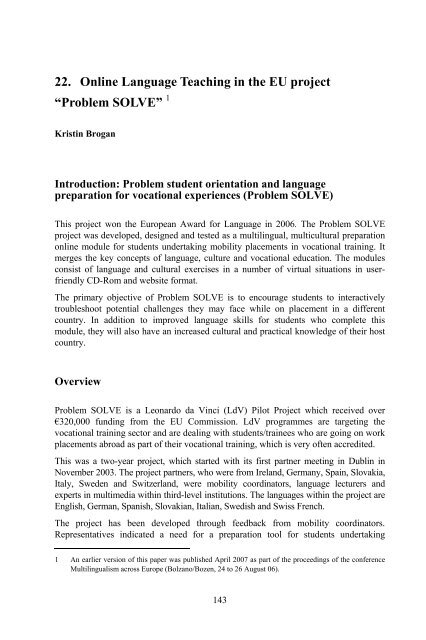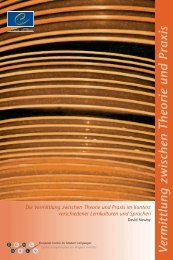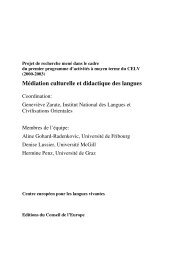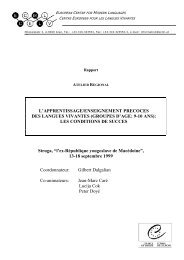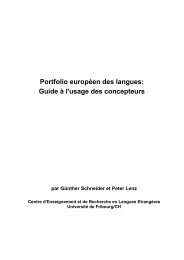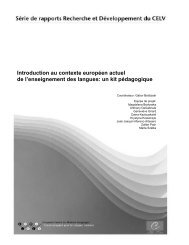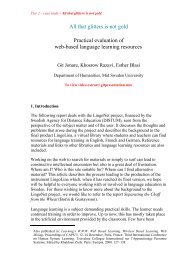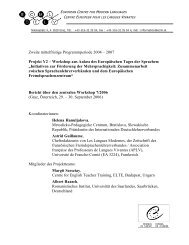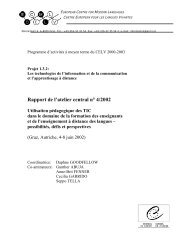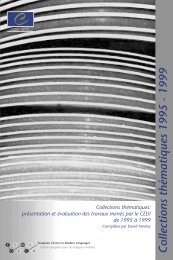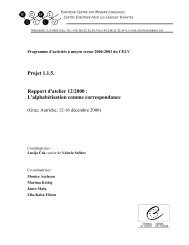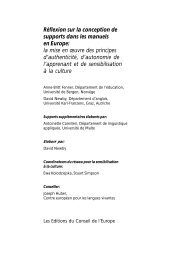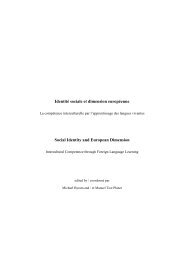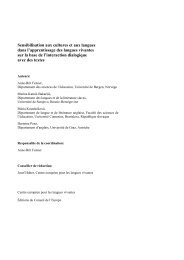cohesion - European Centre for Modern Languages
cohesion - European Centre for Modern Languages
cohesion - European Centre for Modern Languages
Create successful ePaper yourself
Turn your PDF publications into a flip-book with our unique Google optimized e-Paper software.
22. Online Language Teaching in the EU project<br />
“Problem SOLVE” 1<br />
Kristin Brogan<br />
Introduction: Problem student orientation and language<br />
preparation <strong>for</strong> vocational experiences (Problem SOLVE)<br />
This project won the <strong>European</strong> Award <strong>for</strong> Language in 2006. The Problem SOLVE<br />
project was developed, designed and tested as a multilingual, multicultural preparation<br />
online module <strong>for</strong> students undertaking mobility placements in vocational training. It<br />
merges the key concepts of language, culture and vocational education. The modules<br />
consist of language and cultural exercises in a number of virtual situations in userfriendly<br />
CD-Rom and website <strong>for</strong>mat.<br />
The primary objective of Problem SOLVE is to encourage students to interactively<br />
troubleshoot potential challenges they may face while on placement in a different<br />
country. In addition to improved language skills <strong>for</strong> students who complete this<br />
module, they will also have an increased cultural and practical knowledge of their host<br />
country.<br />
Overview<br />
Problem SOLVE is a Leonardo da Vinci (LdV) Pilot Project which received over<br />
€320,000 funding from the EU Commission. LdV programmes are targeting the<br />
vocational training sector and are dealing with students/trainees who are going on work<br />
placements abroad as part of their vocational training, which is very often accredited.<br />
This was a two-year project, which started with its first partner meeting in Dublin in<br />
November 2003. The project partners, who were from Ireland, Germany, Spain, Slovakia,<br />
Italy, Sweden and Switzerland, were mobility coordinators, language lecturers and<br />
experts in multimedia within third-level institutions. The languages within the project are<br />
English, German, Spanish, Slovakian, Italian, Swedish and Swiss French.<br />
The project has been developed through feedback from mobility coordinators.<br />
Representatives indicated a need <strong>for</strong> a preparation tool <strong>for</strong> students undertaking<br />
1 An earlier version of this paper was published April 2007 as part of the proceedings of the conference<br />
Multilingualism across Europe (Bolzano/Bozen, 24 to 26 August 06).<br />
143


